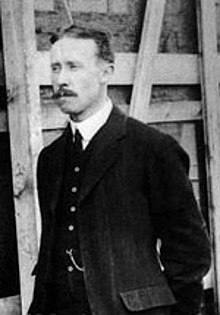John William Dunne
Appearance

John William Dunne FRAeS (2 December 1875 – 24 August 1949) was a British aeronautical engineer, philosopher and author. In the early 20th century, he developed the first stable aircraft, many of a characteristic tailless swept-wing design. He later became known as a philosopher through his theory of serialism, on the nature of time and consciousness.
| This article on an author is a stub. You can help out with Wikiquote by expanding it! |
Quotes
[edit]Lecture to the Royal Aeronautical Society (1913)
[edit]- Dunne, John William; "The Theory of the Dunne Aeroplane", The Aeronautical Journal, Vol. 17, No. 66, April 1913, pp. 83-102.
- But the facts are unquestioned. The aeroplane does do these things, and if the theory does not give warranty for the practice, then it is the theory which is wrong.
An Experiment with Time (1927)
[edit]- Dunne, John William; An Experiment With Time, (reprint), Hampton Roads, 2001.
- Now, when we say of any occurrence that it is 'physical', we mean thereby that it is potentially describable in physical terms. (Otherwise the expression would be wholly meaningless.) So it is perfectly correct, to state that, in every happening with which our sensory nerves are associated, we find, after we have abstracted therefrom every known or imaginable physical component, certain categorically nonphysical residua.
- Ch. II, p. 5
- We have now arrived within introductory range of that very meek-spirited creature known to modern science as the "Observer". It is a permanent obstacle in the path of our search for external reality that we can never entirely get rid of this individual. Picture the universe how we may, the picture remains of our making.
- Ch. III
- It is never entirely safe to laugh at the metaphysics of the 'man-in-the-street'. Basic ideas which have become enshrined in popular language cannot be wholly foolish or unwarranted. For that sort of canonization must mean, at least, that the notions in question have stood the test of numerous centuries and have been accorded unhesitating acceptance wherever speech has made its way.
- Ch. XVII, opening paragraph
- Reasoning is a retrospective business—the judging of a present situation in the light of past experience.
- Ch. XXIII
- We must live before we can attain to either intelligence or control at all. We must sleep if we are not to find ourselves, at death, helplessly strange to the new conditions. And we must die before we can hope to advance to a broader understanding.
- Ch. XXIII, closing paragraph; p. 111

